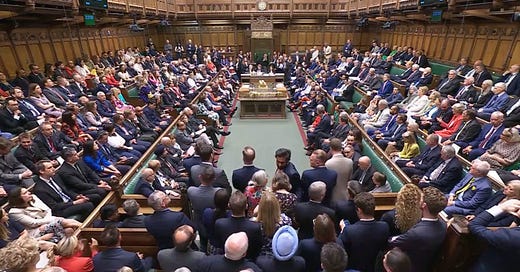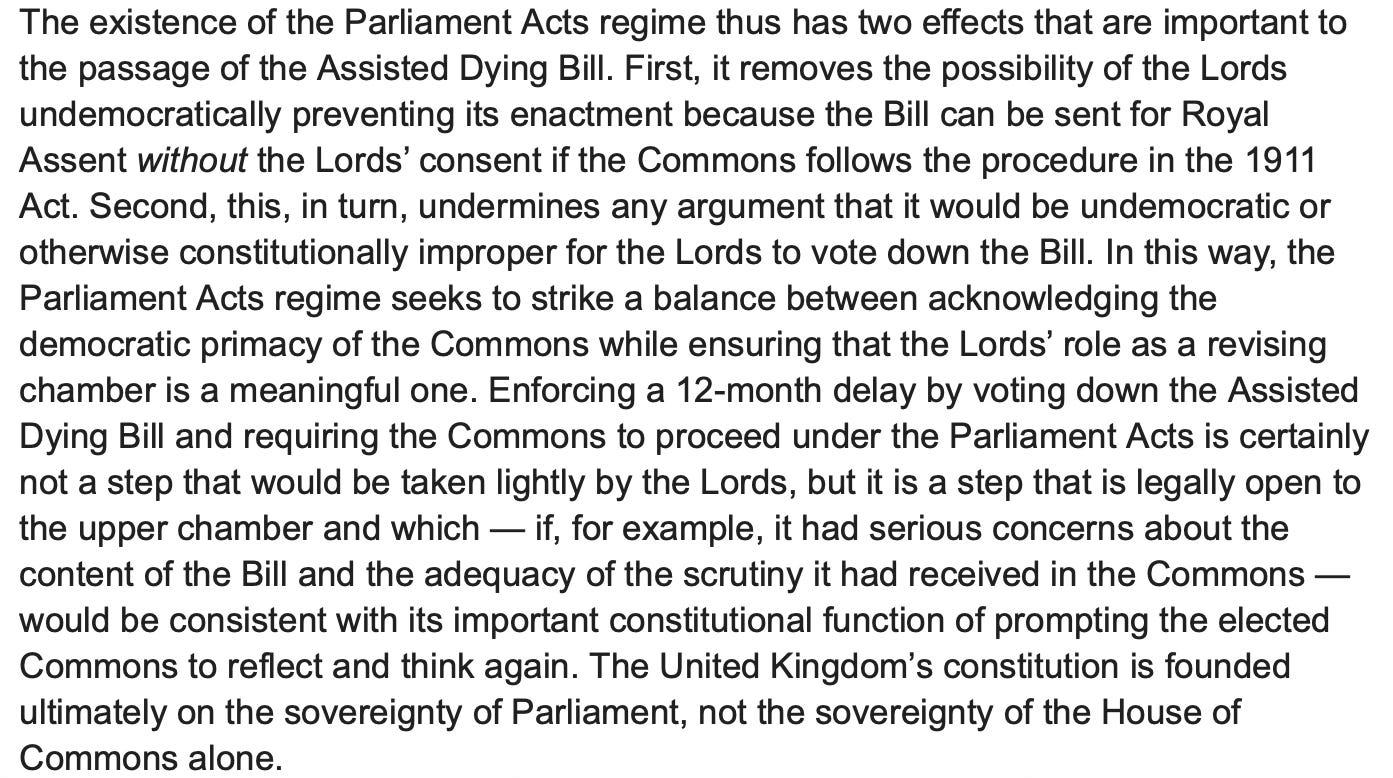Things are not always as they seem. First impressions — newspaper headlines, for example — can be misleading. Here are three examples.
Assisted Dying
Last Friday, MPs voted by 341 votes to 291 to give the Terminally Ill Adults (End of Life) Bill a third reading.
The bill will now be considered by the House of Lords. Some observers are assuming this will be no more than a formality, as this Guardian headline suggests:
The bill’s supporters are certainly arguing that parliament’s upper chamber is under a duty to respect the will of the elected house.
“Ultimately it is for the Commons to decide on whether we should have an assisted dying law, and what its shape will be,” Lord Falconer of Thoroton told a news conference last Thursday. “And we in the Lords will do what we do best, which is scrutinise the details but leave the main decisions to the Commons.”
Falconer hopes to be the backbench peer who’ll steer Kim Leadbeater’s private member’s bill through the remainder of its parliamentary passage. But, as a former lord chancellor, he knows that getting it passed by the Lords may not be straightforward.
Mark Elliott, professor of public law at the University of Cambridge, wasted no time in explaining some of the hurdles. Writing on Friday evening, he pointed out that even the bill’s supporters are expecting it to be amended in the Lords:
Given the modest size of the majority the bill secured in the Commons, and the position of many MPs that they support the principle of assisted dying but have misgivings about the safeguards in this particular bill, it is entirely conceivable that some amendments made by the House of Lords might go on to be approved by the Commons.
It follows that the bill as it exists today is not the final word, and that any eventual act of parliament might differ, at least on points of detail.
But that’s not all. The House of Lords could simply prevent the bill from becoming law.
Blocking a bill
This is how an art of parliament normally begins:
But this is what we find in the War Crimes Act 1991:
Legislation that allowed defendants to be tried in the UK for war crimes committed in Nazi Europe became law without the advice and consent of the Lords. That was possible because the Parliament Act 1911, as amended by the Parliament Act 1949, says that if a bill is passed by the House of Commons in two successive parliamentary sessions — but is rejected by the House of Lords in each of those sessions — it can be granted royal assent once a year has elapsed.
As Elliott argues,
But, as Elliott points out, there’s a catch in the 1911 act. For the procedure to work, the version of the bill passed by the Commons in the second session must be “identical” to the version passed in the first — subject to exceptions in section 2(4). So we would need either a backbench MP or a government minister to table an admittedly inadequate bill next year and resist all attempts to improve it.
And that’s where the government comes in. It was perfectly legitimate to use Leadbeater’s bill as a test of opinion in the Commons. Sooner or later, though, ministers must give a lead.
This is what the health secretary Wes Streeting told his constituents on Saturday:
It seems to me that the right thing for the government to do now is to consult widely, decide what it wants to do, find the necessary resources and then bring fresh legislation before parliament in place of Leadbeater’s bill.
Self-administered abortion
Reuters, the world’s largest multimedia news provider, published this headline last Wednesday morning:
But this is what it should have said:
As MPs took pains to point out, there will be no change to the Abortion Act 1967, which allows a registered medical practitioner in England and Wales to terminate a pregnancy in specified circumstances.
Instead, the Commons added a new clause to the government’s Crime and Policing Bill.
It says:
For the purposes of the law related to abortion, including sections 58 and 59 of the Offences Against the Person Act 1861 and the Infant Life (Preservation) Act 1929, no offence is committed by a woman acting in relation to her own pregnancy.
As the justice minister Alex Davies-Jones explained,
Section 58 of the Offences Against the Person Act 1861 is the offence of administering drugs or using instruments to procure an abortion. It is an offence for a pregnant woman to unlawfully take a drug or use instruments with the intent of procuring her own miscarriage.
It is also an offence for another person who has the intent of procuring the miscarriage of a woman, whether or not she is pregnant, to unlawfully administer drugs or use instruments with that intent.
It is also an offence under section 59 of the 1861 act for a person to supply or procure drugs, poison or an instrument that was intended to be used to procure a miscarriage.
The Infant Life (Preservation) Act 1929 deals with acts in the later stages of pregnancies, including late-term abortions in England and Wales. Under section 1 of the 1929 act, it is an offence for any person to intentionally destroy the life of a child before it is born, if it is capable of being born alive, unless it can be proved that the act was done in good faith and only to preserve the life of the woman.
Tonia Antoniazzi, the Labour backbencher who successfully moved the amendment, provided an explanatory note. It said:
This new clause would disapply existing criminal law related to abortion from women acting in relation to her own pregnancy at any gestation, removing the threat of investigation, arrest, prosecution or imprisonment.
It would not change any law regarding the provision of abortion services within a healthcare setting, including but not limited to the time limit, telemedicine, the grounds for abortion or the requirement for two doctors’ approval.
We can see that the new clause would not repeal either section 58 or 59. And that’s not what anybody would want. Only last year, Stuart Worby, 40, was found guilty at Norwich Crown Court of administering poison with intent to procure a miscarriage, contrary to section 58 of the 1861 act. His sentence was increased by the Court of Appeal from 12 years to 17 years.
What happens now?
The Crime and Policing Bill has just started its progress through the House of Lords. Antoniazzi’s amendment is included as clause 191. There’s no reason to suppose it will be blocked by the Lords.
Does it do the job? The amendment’s supporters clearly intended that it should no longer be a criminal offence for a pregnant woman to terminate her own pregnancy, regardless of the gestation period.
But what’s covered by “a woman acting in relation to her own pregnancy”? Should it be an offence for a woman to intentionally deceive a registered medical practitioner about the gestation of her pregnancy in order to procure abortion pills by post beyond the 10-week time limit? Should it be illegal for a pregnant woman to obtain abortion pills and give them to a friend?
“In fulfilling our duty to ensure that the legislation is legally robust and workable”, said the justice minister, the government would work closely with Antoniazzi to make sure her new clause accurately reflected her intentions and the will of parliament — and was “coherent with the statute book”. So the clause may be reworded before the bill returns to the Commons.
Iran
Broadcasters have been asking me whether the US bombing attacks against three nuclear sites in Iran were lawful — both under US law and under international law. Those who are not interested in my assessment should look away now.
US law
Under the US constitution, Congress has the power “to declare war”. But, as John Bellinger III writes, “this authority has never been interpreted — by either Congress or the executive branch — to require congressional authorisation for every military action that the president could initiate.”
Bellinger was legal adviser at the US State Department under President George W Bush and is now an adjunct senior fellow at the US Council on Foreign Relations. He says the US president’s powers under article II of the constitution
include authority not only to order the use of military force to defend the United States and US persons against actual or anticipated attacks but also to advance other important national interests. Presidents of both parties have deployed forces and ordered the use of military force, without congressional authorisation, on numerous occasions.
Bellinger also discusses whether congressional approval would have been desirable. It would, of course, have reduced the element of surprise.
The bigger question is whether the US mission was lawful under international law.
Writing before the weekend, Bellinger said:
It would be hard to argue that a US attack against Iran’s nuclear complex or leadership would constitute an act of self-defence against an imminent armed attack by Iran on the United States.
Instead, the Trump administration might argue that an attack on Iran constitutes an act of collective self-defence of Israel. The validity of this argument would depend on whether Israel acted in accordance with international law in attacking Iran in the first place and whether US use of force is limited to protecting Israeli civilians and US interests from Iranian attacks.
Let’s unpick those arguments.
International law
The United Nations charter bans the use of armed force by one state against another unless it has been authorised by the UN Security Council.
But article 51 of the charter says:
Nothing in the present Charter shall impair the inherent right of individual or collective self-defence if an armed attack occurs against a Member of the United Nations, until the Security Council has taken measures necessary to maintain international peace and security.
Measures taken by Members in the exercise of this right of self-defence shall be immediately reported to the Security Council and shall not in any way affect the authority and responsibility of the Security Council under the present Charter to take at any time such action as it deems necessary in order to maintain or restore international peace and security.
Anticipatory self-defence
There has been much discussion about the meaning of self-defence. Clearly, it is lawful for Israel to shoot down a missile that is about to hit its territory. And there can surely be no doubt that Israel may bomb a launcher in Iran from which the Iranians are about to fire missiles at Israel.
This can be described as anticipatory self-defence. You can attack your attacker if an attack is imminent. That principle — which applies equally well in domestic law — seems undisputed. But there is a great deal of argument over what “imminent” means.
So, for example, Professor Marko Milanovic argued on 13 June that Israel’s attack on Iran — “Operation Rising Lion” — was not lawful because, in Milanovic’s view, “there is simply no plausible way of arguing that Iran was about to attack Israel with a nuclear weapon”. So Israel’s use of force against Iran was, “on the facts as we know them, almost certainly illegal”.
That thinking may have influenced the attorney general, Lord Hermer KC. “The AG has concerns about the UK playing any role in this except for defending our allies,” Tim Shipman of the Spectator was told by an official who had apparently seen Hermer’s legal advice to ministers.
The authenticity of Shipman’s account was borne out by a report on Saturday that the Cabinet Office had been instructed to carry out an official leak inquiry. That information was itself leaked to the Telegraph.
But if “defending our allies” is lawful, in Hermer’s view, it’s not clear why the UK cannot help defend Israel from the missile attacks that have caused death and destruction during the past 10 days. Or is Hermer arguing that Israel deserves everything it gets because it attacked Iran first?
If so, this would be an extraordinary obtuse reading of the situation.
As Amichai Cohen and Yuval Shany argued on 15 June, Milanovic was asking himself the wrong question. “If indeed,” they accepted, “Operation Rising Lion involves a use of force in anticipation of a non-imminent future threat — nuclear or conventional — there is good reason to deem it unlawful.” But Israel was not relying on anticipatory self-defence at all.
As the two authors observed, Israel’s argument is that this was a new phase in an ongoing operation:
Indeed, in his announcement of the operation Prime Minister Netanyahu referred to the future existential risks for Israel posed by Iran’s nuclear programme but also to Iran’s direct attacks against Israel in 2024 and its use of proxies against Israel in and after 7 October 2023.
Cohen and Shany concluded:
The upshot of our analysis is that a categorical finding that Israel almost certainly violated international law in conducting its attack against Iran seems to us dubious or, at least, premature in nature. A more definitive analysis would require, we believe, more information on the nature of relations of Iran and its proxies and Iran’s substantial involvement in the regional war, as well as on the temporal and other elements of the risk analysis which underlaid Israel’s decision to escalate the conflict.
If there had been any doubt about the legal basis of Israel’s attacks on Iran, it was put to rest by a letter Israel’s foreign minister sent the UN Security Council on 17 June.
Gideon Sa’ar said:
Operation Rising Lion was launched following a critical development in Iran’s nuclear weapons programme and aimed also at thwarting the imminent threat of additional Iranian missile and proxy attacks. While Iran rapidly produces highly enriched uranium, reliable intelligence confirmed in recent months that the Iranian regime had significantly accelerated its clandestine efforts to develop nuclear weapons.
These actions were carried out by Iran while systematically deceiving the international community and obstructing International Atomic Energy Agency safeguards. As recently determined by the International Atomic Energy Agency Board of Governors, Iran is in non-compliance with its Non-Proliferation Treaty safeguards obligation.
Rather than complying with its obligations, Iran responded with a further escalation by expanding its enrichment and other activities to obtain nuclear weapons. Iran’s nuclear strategy is clear: achieve nuclear weapons which will be aimed against the State of Israel.
The letter concluded:
Israel is acting to defend its security and very existence. At the same time, this operation aims to contribute to a safer and more stable Middle East by preventing the tyrannical and extremist Iranian regime from continuing its destabilising actions in the region and beyond.
Iran’s ongoing aggression poses an existantial threat to Israel and a grave threat to international peace and security. Israel will continue to take all necessary measures to protect itself and its citizens, in full accordance with international law.
Sa’ar observed that Israel was conducting precise strikes against military objectives while Iran was deliberately targeting Israel civilians — a point picked up by Natasha Hausdorff in the Telegraph on Saturday:
The existence of this ongoing armed conflict shifts the analysis from the law governing the resort to force — jus ad bellum – to the law governing the conduct of warfare — jus in bello. That is the appropriate lens through which to assess Israel’s actions and its compliance with the key principles governing the conduct of warfare: necessity, distinction, proportionality and precaution.
As in other aspects of Israel’s armed conflict against Iranian proxies, the targeting of military objectives, based on proportionality assessments and accompanied by precautions that strive to reduce civilian casualties and collateral damage, indicates strict adherence to these rules.
The precision and discrimination with which they are conducted remain unprecedented in the history of armed conflict and in many respects exceed the requirements of international humanitarian law.
US involvement
Back, then to the US position. As we have seen, article 51 begins:
Nothing in the present Charter shall impair the inherent right of individual or collective self-defence if an armed attack occurs against a Member of the United Nations
If the Trump administration is arguing that its attack on Iran constitutes an act of collective self-defence of Israel,1 then — as Bellinger said — “the validity of this argument would depend on whether Israel acted in accordance with international law in attacking Iran in the first place and whether US use of force is limited to protecting Israeli civilians and US interests from Iranian attacks”.
My view of that? I’ll let readers draw their own conclusions.2
Update 1400: that does indeed appear to be its position. See remarks to the UN Security Council by the US representative yesterday: “For 40 years, the Iranian government has called for ‘Death to America’ and ‘Death to Israel’ and posed a constant menace to the peace and security of its neighbours, the United States, and the entire world… Madam President, the time finally came for the United States, in the defence of its ally and in the defence of our own citizens and interest, to act decisively.”
Update 24 June: Milanovic remains unpersuaded.













The depth of ignorance of legal matters among even relatively well-educated laypeople is concerning. It even extends to some MPs. This ignorance is exploited by newspaper proprietors and their editors and some politicians of all persuasions. Thank you, Joshua, for the valuable role that your lucid explanations play for all those who are interested in the reality behind the headlines